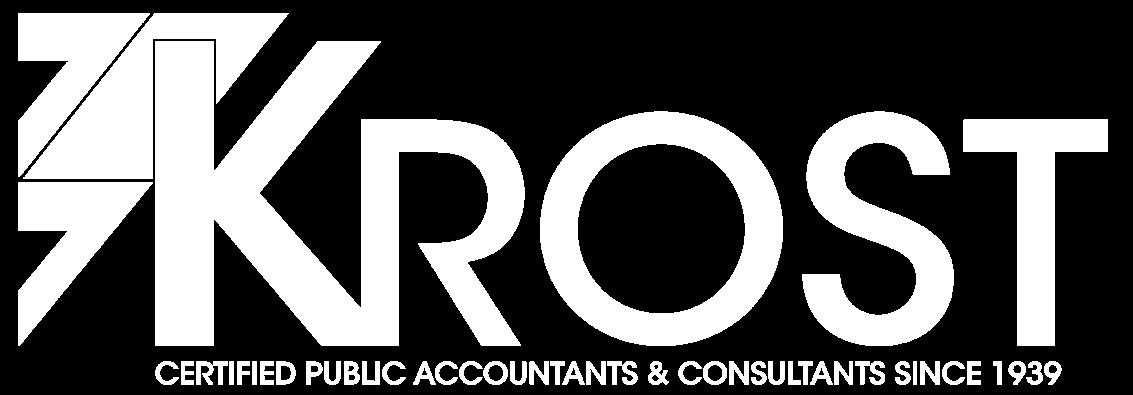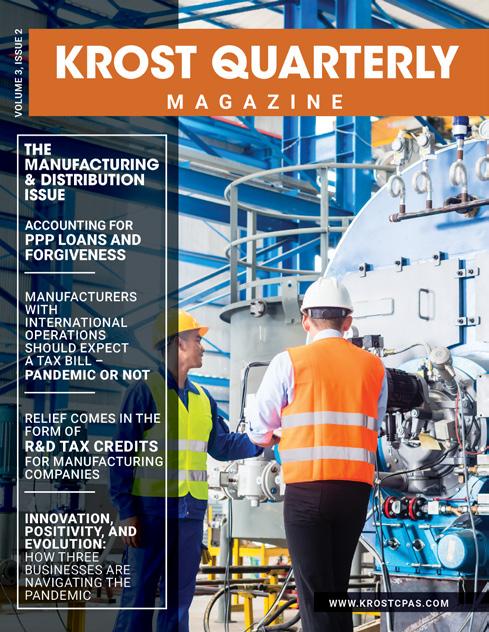KROST INDUSTRY
THE SPORTS & ENTERTAINMENT ISSUE
PROTECTING YOUR ASSETS AND LEGACY: ESTATE AND TRUST MANAGEMENT IN SPORTS AND ENTERTAINMENT
CLIENT ACCOUNTING SERVICE STRATEGIES FOR SUCCESS IN THE SPORTS & ENTERTAINMENT INDUSTRY
UNDERSTANDING THE COMPLEXITIES OF TAX FOR PROFESSIONAL ATHLETES
TAX ESSENTIALS FOR THE SPORTS & ENTERTAINMENT INDUSTRY

MAGAZINE
VOLUME 5, ISSUE 2 WWW.KROSTCPAS.COM
KROSTCPAs.com
Volume 5, Issue 2 / September 2023
Offices
Pasadena (Headquarters) West LA Woodland Hills
Phone: (626) 449-4225
Fax: (626) 449-4471
Principals
Jason C. Melillo, CPA CEO
Gregory A. Kniss, CPA
Lou Guerrero, CPA, MBT
Jean Hagan
So Sum Lee, CPA
Richard Umanoff, CPA, MBA
Douglas Venturelli, Esq.
Evelyn Fernandez, CPA, MST
Stacey Korman, CPA, MST
Keith Hamasaki, CPA
Paren Knadjian
Brad Pauley, CPA
Grant K. Miller, CPA, EA
Matthew Weber, CPA, MAcc
Production, Copy, and Design
Anna Chen, Editor-in-Chief
Mayra Silva, Graphic Designer
Kelley Lau, Assistant Editor
Inquiries may be sent to: admin@KROSTCPAs.com
Stock Photography Adobe Stock - Used with permission
Copyright © 2023 by KROSTCPAs.com
Protecting Your Assets and Legacy: Estate and Trust Management in Sports and Entertainment
By Brad Pauley, CPA & Richard Umanoff, CPA, MBA
Client Accounting Service
Strategies for Success in the Sports &
Entertainment Industry
By Stacey R. Korman, CPA, MST
Understanding the Complexities of Tax for Professional Athletes
By Brad Pauley, CPA
Tax Essentials for the Sports & Entertainment Industry
By Alan Lo, CPA, MAcc & Randall Poe
All rights reserved. No part of this publication may be reproduced, distributed, or transmitted in any form or by any means, including photocopying, recording, or other electronic or mechanical methods, without the prior written permission of the publisher, except in the case of brief quotations embodied in critical reviews and certain other noncommercial uses permitted by copyright law.
1 KROST INDUSTRY VOL. 5 ISSUE 2 - THE SPORTS & ENTERTAINMENT ISSUE
CONTENTS
6
8
11
4 THE SPORTS & ENTERTAINMENT ISSUE KROST Quarterly is a digital publication released by KROST CPAs & Consultants headquartered in Pasadena, California. Established in 1939, this full-service Certified Public Accounting and Consulting firm serves clients across a variety of industries. With a focus on recognizing opportunities and creating value, KROST equips clients with tools to make better business and financial decisions for the future.
INTRODUCING
KROST’S SPORTS & ENTERTAINMENT TEAM
At KROST, we have vast experience in the sports & entertainment industries working with current and former major and minor league players, WGA, DGA, PGA, and SAG members, as well as several Emmy and Academy Award nominees and winners. Our knowledgeable staff can navigate loan-out corporations, Screen Actor Guild (SAG), and pension issues. We also have experience handling state withholding and corporate registrations for California corporations doing business in other states. We are well-versed in multi-state/residency issues as well as full-service business and wealth management services.
Our team produces regular KROST Insights posted to our website. This issue will highlight some of the hot topics in the sports & entertainment industry including tax issues for athletes, estate & trust planning, Client Accounting Services, and more.


2 KROST INDUSTRY VOL. 5 ISSUE 2 - THE SPORTS & ENTERTAINMENT ISSUE
SUBSCRIBE Receive KROST news right to your inbox! To subscribe, click here.
LEARN
MORE
Jason C. Melillo, CPA CEO




SPORTS & ENTERTAINMENT Team at KROST
360° Service Model
• Accounting Services
• Accounting and Bookkeeping
• Accounts Payable – Bill Pay
• Accounts Receivable
• Budgeting
• Business Management
• Client Accounting Services (CAS)
• Personal Accounting Management
• Tax Services
• Audit Support
• Loan-Out Corporation
• Residency/Multi State
• Tax Controversy
• Tax Planning and Strategy
• Wealth Management
• Financial Planning
• Insurance and Risk Management
• Investment Consulting
Experience You Can TrustOur Sector Expertise

• Athletes and sports professionals, including minor and major league baseball, basketball, football, and more
• Sports entertainment
• Pre and post production
• Actors and comedians
• Radio personalities
• News and network
• Models
• Video bloggers (YouTubers)
• Producers (television and motion picture)
• Camera and set lighting
“The experienced, multi-disciplined teams at KROST can provide tax, accounting, and consulting services for very specific needs relating to sports & entertainment, as well as a holistic approach to tackling multiple challenges as a true partner in the development of your profession.”
3 KROST INDUSTRY VOL. 5 ISSUE 2 - THE SPORTS & ENTERTAINMENT ISSUE
Stacey Korman, CPA, MST Principal
- Accounting
Alan
Lo, CPA, MAcc Manager - Tax
Gregory A. Kniss, CPA Chairperson
Brad Pauley, CPA Principal - Tax
Protecting Your Assets and Legacy: Estate & Trust Management in Sports and Entertainment
By Brad Pauley, CPA | Principal - Tax

 By Richard Umanoff, CPA, MBA | Principal - Tax
By Richard Umanoff, CPA, MBA | Principal - Tax
Forathletes, actors, and other high-earning professionals in the sports and entertainment industry, managing assets and planning for the future is essential. One important aspect of this planning is estate and trust management. In this article, we will explore what estate and trust management is and how it can benefit professionals in the sports and entertainment industry.

Estate management involves the planning, administration, and distribution of a person's assets after their death. This includes everything from financial assets like investments and property to personal items like jewelry and artwork. By creating a comprehensive estate plan, individuals in the sports and entertainment industry can ensure that their assets are distributed according to their wishes and that their loved ones are provided for after their passing.
Trust management is similar to estate management but involves the transfer of assets during an individual's lifetime. By setting up a trust, individuals can transfer assets to their beneficiaries while still maintaining some control over those assets. Trusts can be structured in a variety of ways to meet an individual's specific needs and goals, and can provide tax advantages and asset protection.
For professionals in the sports and entertainment industry, estate and trust management is particularly important due to the often high value of their assets and the unique nature of their careers. Many professionals in this field have complex income streams and assets that require careful management and planning especially when their work spans across several states. Each state has their own estate taxes. Here is a listing of top tax rates and exemption thresholds for the 2022 tax year:
4 KROST QUARTERLY VOL. 5 ISSUE 2 - THE SPORTS & ENTERTAINMENT ISSUE
Domicile at time of death is crucial to avoid state inheritance taxes in above states. For estate purposes must have sufficient nexus to state to claim domicile in that state.
One important consideration for estate and trust management in the sports and entertainment industry is the use of intellectual property rights. For example, an athlete may have valuable endorsement deals or a musician may have valuable music rights that need to be properly managed and protected. By setting up a trust or other legal entity to manage these assets, professionals in this field can ensure that their intellectual property rights are protected and that they continue to generate income for their beneficiaries after their passing. At KROST we advise avoiding lawsuits by structuring assets so they don’t hold direct title through creations of LLC, LLP, LLLP or irrevocable trusts. Creation of irrevocable trusts and transfer assets to trusts so any appreciation in asset is removed from their estate and protected from future potential creditors.
Another important consideration for estate and trust management in the sports and entertainment industry is tax planning. By structuring trusts and other legal entities in a tax-efficient manner, individuals in this field can minimize their tax burden and maximize the amount of assets that are passed on to their beneficiaries. Athletes and celebrities must plan for a client’s “right of publicity” and whether this intangible asset is included in their estate assets.
In conclusion, estate and trust management is an important consideration for professionals in the sports and entertainment industry. By working with experienced attorneys and financial advisors, individuals in this field can create comprehensive estate plans that protect their assets and ensure that their loved ones are provided for after their passing. Whether through the use of trusts, intellectual property rights management, tax planning, or other strategies, estate and trust management can provide peace of mind and help individuals in the sports and entertainment industry plan for a secure financial future.
5 KROST INDUSTRY VOL. 5 ISSUE 2 - THE SPORTS & ENTERTAINMENT ISSUE CONTACT BRAD
TOP
XEMPTION THRESHOLD Connecticut 12% $9,100,000 District of Columbia 16% $4,000,000 Hawaii 20% $5,490,000 Illinois 16% $4,254,800 Maine 12% $6,010,000 Maryland 16% $5,000,000 Massachusetts 16% $1,000,000 Minnesota 16% $3,000,000 New York 16% $6,110,000 Oregon 16% $1,000,000 Rhode Island 16% $1,648,611 Vermont 16% $5,000,000 Washington 20% $2,193,000
STATE
RATES E
CLIENT ACCOUNTING SERVICE STRATEGIES FOR SUCCESS IN THE SPORTS & ENTERTAINMENT INDUSTRY
 By Stacey Korman, CPA, MST | Principal - Accounting
By Stacey Korman, CPA, MST | Principal - Accounting

In the fast-paced and dynamic world of sports and entertainment, financial management plays a crucial role in the success of artists, performers, and athletes. As the complexities of accounting, finance, and taxes continue to increase, professionals in the industry are turning to Client Accounting Service (CAS) providers to streamline their financial operations so they can focus on their creative endeavors. Some effective CAS strategies that can drive success in the sports and entertainment industry include:
ADVANCED TECHNOLOGY INTEGRATION
To keep up with the evolving demands that surround the industry, CAS providers must leverage technologies to streamline the process of preparing financial information. Cloud-based accounting systems allow for real-time access to financial data, facilitating collaboration between the artist, their management team, and accountants. Automated invoicing, expense tracking, bill payment, and investment tracking help to reduce manual errors and save time. By harnessing technology, CAS providers can improve the effectiveness, accuracy, and transparency of financial operations.
6 KROST INDUSTRY VOL. 5 ISSUE 2 - THE SPORTS & ENTERTAINMENT ISSUE
TAILORED FINANCIAL SOLUTIONS
The sports and entertainment industry presents unique financial challenges that require specialized solutions. Our CAS experts who understand these intricacies can develop tailored financial systems and processes, including managing revenue streams from multiple sources, tracking royalties and licensing agreements, budgeting for projects, and optimizing tax planning. By customizing services to align with the industry's unique requirements and needs, our team can help their clients maximize financial efficiency and profitability.
FINANCIAL PLANNING AND BUSINESS ADVISORY

Beyond day-to-day accounting tasks, our CAS providers offer valuable financial planning and business advisory services to clients in the sports and entertainment industry. This includes budgeting, tax planning, and long-term financial strategies. Through insightful guidance, our CAS professionals empower their clients to make informed decisions, optimize their financial resources, and drive sustainable growth in their careers or businesses.
Client Accounting Services have become a critical component of success in the sports and entertainment industry. By implementing tailored financial solutions, leveraging advanced technologies, and offering comprehensive financial planning and business advisory services, we can help artists and their production companies navigate the complex financial landscape. With a solid CAS strategy in place, these professionals can focus on their creative pursuits knowing that their financial operations are organized, compliant, and optimized for success.
7 KROST INDUSTRY VOL. 5 ISSUE 2 - THE SPORTS & ENTERTAINMENT ISSUE CONTACT STACEY
"Through insightful guidance, our CAS professionals empower their clients to make informed decisions, optimize their financial resources, and drive sustainable growth in their careers or businesses."
UNDERSTANDING THE COMPLEXITIES OF TAX FOR PROFESSIONAL ATHLETES
 By Brad Pauley, CPA | Principal - Tax
By Brad Pauley, CPA | Principal - Tax

PROFESSIONAL ATHLETE TAXATION
Professional athletes are subject to a complex system of taxation that can vary depending on their state of residence, the sport they play, and the level of income they earn. In general, however, professional athletes are taxed on their income from all sources including salary, bonuses, and endorsements.
STATE INCOME TAX
Professional athletes typically file taxes in the state where they play, as well as the state where they reside. The state where they play will tax them on their income from games played in that state, while the state where they reside will tax them on their entire income. To avoid double taxation, an athlete’s resident state will give credit for taxes paid to other states. If the state you live in taxes you at a higher rate than the state you played in, then you pay the difference between the two states.
FEDERAL INCOME TAX
Professional athletes are also subject to federal income tax with a rate that is typically the same as other highincome earners. s
Another reason to keep track of an athlete’s whereabouts is when they are on the injured reserved list and not traveling with the team. They could be in a low or no-ta
8 KROST INDUSTRY VOL. 5 ISSUE 2 - THE SPORTS & ENTERTAINMENT ISSUE
"Professional athletes are subject to a complex system of taxation that can vary depending on their state of residence, the sport they play, and the level of income they earn."
SOCIAL SECURITY AND MEDICARE TAX
Professional athletes are also subject to Social Security and Medicare taxes. These taxes are withheld from their paychecks and are used to fund Social Security and Medicare programs.
ENDORSEMENT INCOME
Professional athletes who make earnings from endorsements must also file taxes on that income. Endorsement income is typically taxed as ordinary income. However, there are some special rules that apply to endorsement income for professional athletes. For example, if a professional athlete hires an agent/manager to assist with their endorsement deals, then they can write off commissions paid against their endorsement income.

TAX PLANNING
Professional athletes can take steps to minimize their tax liability. One way to do this is to establish residency in a state with a low-income tax rate. This can be discussed with a tax advisor to fit the specific tax situation.
Professional athlete taxation is a complex issue that can vary depending on a number of factors. Professional athletes should consult with a tax advisor to discuss their specific tax situation and to develop a personalized tax plan that minimizes their liability. By delegating your tax matters to a professional, you can dedicate your time and energy to what you do best – dominating your sport and achieving greatness. Contact our team of Sports & Entertainment Industry professionals to minimize your tax liability, maximize your earnings, and secure your financial victory.
CONTACT BRAD
9
INSIDE Public Accounting awards KROST as a Top 100 Firm


SIMPLIFYING THE COMPLEX

CASHFLOW STRATEGIES FOR THE SPORTS & ENTERTAINMENT INDUSTRY

 By Alan Lo, CPA, MAcc | Manager - Tax
By Alan Lo, CPA, MAcc | Manager - Tax
 By Randall Poe | Senior - Tax
By Randall Poe | Senior - Tax
PASSTHROUGH ENTITY TAX CREDITS
The Passthrough Entity Tax Credit, commonly referred to as the State and Local Tax (SALT) cap workaround, was introduced to mitigate the impact of the federal cap on the deduction of state and local taxes under the Tax Cuts and Jobs Act (TCJA) of 2017. The TCJA imposed a $10,000 limit on the deduction of state and local taxes for individual taxpayers. This limit disproportionately affected residents in high-tax states, leading to increased tax liabilities for many business owners.
To address this issue, some states introduced the Passthrough Entity Tax Credit, allowing pass-through entities to be taxed at the entity level instead of the individual level. As a result, the entity avoids the individual SALT cap, and owners of the pass-through entity receive a credit on their personal income tax returns, offsetting their tax liability and reducing their overall tax burden.
IMPLEMENTATION
To implement the Passthrough Entity Tax Credit, eligible pass-through entities typically need to make an election with their state tax authorities. This election is generally made at the beginning of the tax year and remains in effect for the entire year. The entity then calculates and withholds the appropriate state and local taxes on behalf of its owners based on their distributive share of income.
BENEFITS OF THE PASSTHROUGH ENTITY TAX CREDIT
1. Mitigating the SALT Cap Impact – One of the primary benefits of the Passthrough Entity Tax Credit is its ability to mitigate the adverse effects of the SALT cap for business owners in high-tax states. By electing to be taxed at the entity level, owners can still effectively deduct their state and local taxes, reducing their individual tax liability
2. Improved Cash Flow – For owners of pass-through entities, the credit translates to improved cash flow. Since the entity bears the state and local tax burden, owners receive the credit as a refund or carryforward, reducing the amount they owe in taxes.
11 KROST INDUSTRY VOL. 5 ISSUE 2 - THE SPORTS & ENTERTAINMENT ISSUE
IRC SECTION 199A – QUALIFIED BUSINESS INCOME (QBI) DEDUCTION
The Qualified Business Income (QBI) deduction, also known as the Section 199A deduction, is designed to level the playing field for pass-through businesses concerning the significant corporate tax rate reduction introduced by the TCJA. Under the TCJA, C corporations benefit from a lowered corporate tax rate of 21%, while pass-through entities such as partnerships, S corporations, sole proprietorships, and LLCs, face higher individual income tax rates. The QBI deduction seeks to address this disparity by offering a deduction at the individual level, thereby reducing the effective tax rate for qualified business income.

ELIGIBILITY FOR THE QUALIFIED BUSINESS INCOME (QBI) DEDUCTION
To be eligible for the QBI deduction, business owners must meet certain criteria:
1. Pass-Through Entity – The deduction is available to owners of pass-through entities, which include partnerships, S corporations, sole proprietorships, and some LLCs.
2. Qualified Business Income – The deduction is generally applicable to income generated by the business itself, excluding investment income, such as capital gains, dividends, and interest, as well as certain types of specialized income.
3. Income Thresholds – The deduction has specific income thresholds beyond which the benefit of the QBI deduction may be limited or phased out. These thresholds are subject to change and should be considered in consultation with a tax advisor.
4. Specified Service Trade or Business (SSTB) – For higher-income taxpayers, there are limitations on the QBI deduction if their business is considered a specified service trade or business. These include fields such as law, accounting, health, consulting, and others. The limitations phase out for SSTBs as the taxpayer's income exceeds certain thresholds.
CALCULATING THE QUALIFIED BUSINESS INCOME (QBI) DEDUCTION
The computation of the QBI deduction can be intricate and it is essential to work with a qualified tax professional to ensure accuracy. In general, the deduction is calculated as follows:
1. Determine Qualified Business Income – This involves identifying the business income that qualifies for the deduction and excluding any income that does not meet the QBI criteria.
2. Calculate the Deduction – For most eligible taxpayers, the QBI deduction is 20% of the qualified business income. However, as mentioned earlier, certain limitations and phase-outs may apply based on income levels and business type.
LEVERAGING THE BENEFITS
The QBI deduction presents significant opportunities for tax optimization and savings for eligible business owners. To make the most of this deduction, consider the following strategies:
1. Entity Structure – Depending on the business's unique circumstances, it may be advantageous to choose a specific entity structure that maximizes the QBI deduction, while considering other factors like liability protection and management.
2. Wage and Capital Limitations – In some cases, it may be beneficial to adjust the business's wage and capital structure to optimize the deduction, especially for businesses nearing the threshold for limitations.
3. Strategic Tax Planning – Engage in proactive tax planning throughout the year to optimize deductions, expenses, and overall business income, ensuring the greatest benefit from the QBI deduction.
IRC SECTION 181 – IMMEDIATE EXPENSING OF QUALIFIED PRODUCTION COSTS

The Section 181 tax break for film or television productions originated back in 2004 and is currently extended until the end of 2025. Under the current extender, taxpayers can make the election for each production and deduct up to $15 million ($20 million in certain qualified low-income/distressed areas) of qualified production costs for each production as they are incurred. In order to qualify for immediate expensing, IRC Section 181(d) requires at least 75% of the production compensation costs to be incurred within the United States.
LEVERAGING THE BENEFITS
Rather than deducting the expenses after the release date through amortization, Section 181 is an alternative tool for production companies to minimize the timing difference between production costs and the revenue it generates. On the other hand, the opportunity to use Section 181 can dramatically change the outlook of an investor’s risk assessment on a film project. The money invested and spent is expensed as incurred and will create a loss that can be passed on to the investor. This could be a considerable tax benefit in the same year when the production begins.
13 KROST INDUSTRY VOL. 5 ISSUE 2 - THE SPORTS & ENTERTAINMENT ISSUE
"The Qualified Business Income (QBI) deduction, also known as the Section 199A deduction, is designed to level the playing field for pass-through businesses concerning the significant corporate tax rate reduction introduced by the TCJA. "
MAKING THE ELECTION
In general, the election must be made by the due date (including any extension) for filing the taxpayer’s federal income tax return for the first taxable year in which the production costs have been incurred. If there are multiple productions that the taxpayer wishes to elect into Section 181 for immediate expensing, the taxpayer must make the election separately for each production.
For each production that Section 181 applies, the taxpayer must attach a statement to the taxpayer’s federal income tax return with the following detail at a minimum:
1. The name (or other unique identifying designation) of the production
2. The date of the production costs was first incurred for the production
3. The amount of aggregate qualified production costs and compensations incurred for the production during the taxable year
4. A declaration that the taxpayer reasonably expects that both the production will be a qualified film or television production and the aggregate production costs will not exceed the applicable aggregate production costs limit

For the subsequent years after the initial election, the taxpayer is required to continue reporting the above items as a separately attached statement and update accordingly.
CONCLUSION
As tax laws and regulations are continually evolving, staying up-to-date and making informed decisions is paramount for achieving tax efficiency and compliance. It is crucial for business owners to consult with qualified tax advisors to understand the eligibility, potential benefits, and implications of the above-mentioned tax strategies for their specific circumstances.
At KROST, we have vast experience in the Sports & Entertainment industry, handling everything from basic accounting and tax services to full-service business and wealth management services. Our firm has the services and expertise needed to assist Sports & Entertainment professionals in maintaining their financial success.
CONTACT TAX
ENJOYED THIS ISSUE?


CLICK BELOW TO READ OUR OTHER ISSUES

Flip through our collection of this interactive publication for detailed information, charts, and tools covering the latest news in financial services, hospitality, technology, sports and entertainment, real estate, and manufacturing.



LET US KNOW YOUR FEEDBACK! IS THERE ANYTHING YOU WOULD LIKE TO SEE IN AN UPCOMING EDITION?

MANUFACTURING Read Now
HOSPITALITY Read
SPORTS & ENTERTAINMENT
Now » REAL ESTATE Read Now » TECHNOLOGY
Now » FINANCIAL SERVICES
Now »
»
Now »
Read
Read
Read
KROST INDUSTRY
For over 80 years, KROST has assisted businesses and individuals to reach their financial goals through their in-depth knowledge of Tax, Accounting, Assurance & Advisory, Client Accounting Services (CAS), Mergers & Acquisitions, Wealth Management Services, KROST Business Intelligence (KBI), and KROST Fund Admin Solutions. KROST also provides specialty tax services such as Cost Segregation Studies, R&D Tax Credits, Transfer Pricing, Green Building Tax Incentives, Repair vs. Capitalization, Fixed Asset, IC-DISC, and more.
Pasadena • Woodland Hills
West Los Angeles
Phone: (626) 449-4225
Fax: (626) 449-4471
KROSTCPAs.com
MAGAZINE KROSTCPAS.COM










 By Richard Umanoff, CPA, MBA | Principal - Tax
By Richard Umanoff, CPA, MBA | Principal - Tax

 By Stacey Korman, CPA, MST | Principal - Accounting
By Stacey Korman, CPA, MST | Principal - Accounting


 By Brad Pauley, CPA | Principal - Tax
By Brad Pauley, CPA | Principal - Tax





 By Alan Lo, CPA, MAcc | Manager - Tax
By Alan Lo, CPA, MAcc | Manager - Tax
 By Randall Poe | Senior - Tax
By Randall Poe | Senior - Tax









